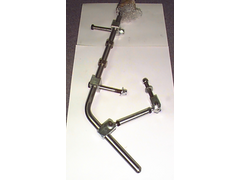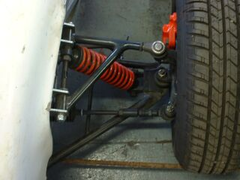
anti roll bar questions?
darren(SA) - 17/8/03 at 09:33 PM
Hi guys,
I want to make and fit a anti roll bar but want to find out some theory first:
I know it does improve the handling, but to what extent?
The thicker the better, how true is this?
What diameter bar are you guys using?
thanks
darren
[Edited on 17/8/03 by darren(SA)]
pbura - 18/8/03 at 04:06 AM
Hi Darren,
I'm planning to use an anti-roll bar, too, so I can run softer springs for a better ride, and still have good roll resistance.
The key concept for springs and bars is "roll couple", or the percentage of front to total roll resistance. There's a good write-up
about roll couple, anti-roll bars, and springs here:
http://members.aol.com/sccacuda/cars/1SmthTa.html
Somewhere I read a recommendation that 50% of roll resistance come from the springs, and the other 50% from the anti-roll bar. This struck me as a
very reasonable rule of thumb for avoiding nasty one-wheel road shocks.
Please post about your progress with the bar, as I am very interested in the construction details (I haven't started yet  )
)
Best of luck,
Pete B.
pbura - 18/8/03 at 12:43 PM
Also found this Locost thread:
http://forum.locostbuilders.co.uk/xmb/viewthread.php?tid=5560
Pete
dozracing - 18/8/03 at 08:13 PM
Some time ago i advertised an ARB kit, which i'm happy to revisit (still have design etc) if anyone is interested. Email off list please.
Kind regards,
Darren
darren(SA) - 18/8/03 at 08:57 PM
Thanks!
The problem is i'm not sure what ratings my front springs are, I've got plenty bars lying around (various diameters), I think the best thing
would be to experiment, starting off with one around 10-12mm!
I'll keep you posted!
cheers
darren
[Edited on 18/8/03 by darren(SA)]
Rob Lane - 19/8/03 at 08:26 AM
Pic of a front ARB kit. No longer available from supplier but good for idea of how it would fasten.
Long bolts replace upper wishbone front bolt.
Bolt on downlink replaces shocker lower bolt. Downlink is adjustable along bar for stiffer/softer.
Rob Lane
[Edited on 19/8/03 by Rob Lane]


Rescued attachment frontarb2.jpg
pbura - 19/8/03 at 12:59 PM
That's a beautiful kit; it doesn't look very Locost, however.  Is it yours, Rob?
Is it yours, Rob?
Very clever idea to adjust the stiffness by varying the length of the arms, have never seen that before.
There are "universal" kits available in the US but there is very little control over the spec, so I would like to try making my own. Parts
for track use are expensive! If anyone has any tips for a cheap DIY bar, I'd love to hear about it.
Pete B.
dozracing - 19/8/03 at 01:24 PM
This system is dead standard way of doing it, although the one in the pic is way over engineered and too heavy looking.
Basically you can buy all the bits off the shelf cheap and bend up a tube to suit.
Email off list and i'll tell you were all the bits come from.
I still have some parts in stock.
Darren
darren(SA) - 19/8/03 at 08:29 PM
for some reason i can't view your picture Rob, not serious,
I have posted some pics that I took at a race day, seems like this is a popular method.
cheers
darren


pbura - 20/8/03 at 04:58 AM
quote:
This system is dead standard way of doing it
Open mouth, insert foot (referring to my ingenuous assessment).
Then again, I've never even seen a Seven, either. My wife saw a C*t*rh*m, though, just last week. She said it struggled across some RR tracks
at a walking pace.
All the more reason for an ARB.
Pete
[Edited on 20/8/03 by pbura]
Rob Lane - 20/8/03 at 07:53 AM
Pic was for idea only.
It was beautifully engineered and was priced at £80 for full kit, not bad for the quality I thought.
Westfield use 20mm solid bar for front and 20mm 16g tube for rear.
Rob Lane
eddymcclements - 20/8/03 at 09:14 AM
quote:
Originally posted by dozracing
This system is dead standard way of doing it, although the one in the pic is way over engineered and too heavy looking.
Basically you can buy all the bits off the shelf cheap and bend up a tube to suit.
On what do you base your assertion that the bar is too heavy looking and over-engineered? It looks very similar to ARB kits used at the front of many
Se7ens, including this Leitch and this
Westfield.
Cheers,
Eddy
darren(SA) - 20/8/03 at 01:56 PM
Ah now I see it!
It does look quite thick, similar to the setup in the pics i posted.
A buddy of mine has an original Birkin/lotus 7 and if i'm not mistaken, I think the anti-roll bar is at the bottom of the suspension.not sure
tho.
cheers
darren
[Edited on 20/8/03 by darren(SA)]
pbura - 20/8/03 at 03:59 PM
There's been much discussion on the Locost Theory list in the past, might be worth a look. Try searching on "torsion bars".
This bar in Rob's photo does look big. If it's 25mm as it appears, the rate would be over 400 lbs/in, rather too much for street use, and
there would most likely be a bar at the rear, too, to balance it out. Probably 18-20 mm for a standalone front bar would be best for most cars,
depending on arm length.
If one is A) a math genius or B) has a copy of Race Car Vehicle Dynamics by Milliken and Milliken (I'd like one but it's not Locost),
it's possible to predict how much your car will roll with a given G force. Check this out:
http://www.smithees-racetech.com.au/wttransworksheet.html
Anyone want to tell us all how? 
Pete
darren(SA) - 21/8/03 at 07:44 PM
I was messing around with a dodgy piece of bar today, and just happened to have my camera handy.
I found a nice little opening below my suspension arm and a bit above the chassis,
now looking at where the bar is running( don't worry i'll get a new 1) If I had to bend this to match the angle on my arm and fasten the
both sides on with a rubber spacer and clamp, do you guys think it would work? would the movement of the suspension arm complement the anti-roll
bar?
I would also add bushes clamped to chassis allowing the bar to still move freely, just inside where you can't see and 1 in the middle.
thanks
darren
sorry, not sure if pic came out, here it is again

[Edited on 21/8/03 by darren(SA)]


Rescued attachment bar.jpg
Rorty - 22/8/03 at 01:49 AM
Yes, just roughly follow the shape of the upper wishbone, but I would make new upper wishbones first. Those ones in the photo look very weak at their
outer ends. The front diagonal leg of the wishbone, should really run to the very outer end of the rear leg/ferule.
The ferule/threaded tube, is a weak spot, as the threads themselves act as stress risers, and so, should be braced.
Most motor factors suspension catalogues show PU generic ARB/sway bar bushes and bracketry, though you may need to fab the actual link along the lines
of the ones in the other photos.

type 907 - 22/8/03 at 06:25 AM
Hi
I am probably wrong, but I have always asumed arb's are made of spring steel. Is this true?
darren(SA) - 22/8/03 at 11:14 AM
point taken.
Although the photo is a bit deceptive, the diameter of the top wishbone is 22mm, the ball joint thread is 16mm,and the thread runs past where the
welding starts. 3 mm wall minus thread... mmm could be a bit weak.I'll def have look into that!!!!
The bottom are made out of a 26mm bar, that should be fine.
quote:
Yes, just roughly follow the shape of the upper wishbone,
don't you mean the bottom?
thanks
darren
pbura - 22/8/03 at 12:02 PM
Darren,
The bar shouldn't be attached directly to the lower wishbone, but linked. Reason is that the ARB arm will move in an arc while the wishbone goes
straight up and down, which would cause binding.
It doesn't look like you have a good place to mount a link on the lower wishbone except the shock mount, so I'd recommend mounting the bar
higher up (as per Rorty's comment).
Type 907: Yes, and the bar should be heat treated. This makes me wonder about the economy of a DIY ARB. Small batches can be expensive unless you
have a friendly source.
Pete
[Edited on 22/8/03 by pbura]
Alan B - 22/8/03 at 12:38 PM
quote:
Originally posted by type 907
Hi
I am probably wrong, but I have always asumed arb's are made of spring steel. Is this true?
You are correct..they should be spring steel.
Fast Westie - 16/10/03 at 03:52 PM
quote:
Westfield use 20mm solid bar for front and 20mm 16g tube for rear.
I don't think so, this would hardly allow any suspension movement and the car would understeer badly. I think the front is 20mm 14g tube...
 )
) 







